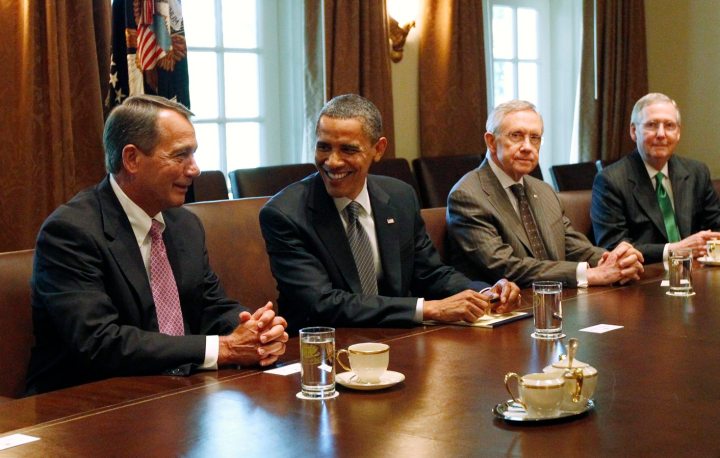Newsdeck
White House, Republicans Dig In Ahead Of Budget Talks

Positions hardened on Wednesday between President Barack Obama and Republican congressional leaders over the budget crisis even as they arranged to hold last-ditch talks to prevent harsh automatic spending cuts beginning this week. By Jeff Mason and Steve Holland.
Looking resigned to the $85-billion in “sequestration” cuts starting on Friday, government agencies began reducing costs and spelling out to employees how furloughs will work.
Expectations were low that a White House meeting on Friday between Obama and congressional leaders, including Republican foes, would produce any deal to avoid the cuts.
Public services across the country – from air traffic control to food safety inspections and education – might be disrupted if the cuts go ahead.
Put into law in 2011 as part of an earlier fiscal crisis, sequestration is unloved by both parties because of the economic pain it will cause, but the politicians cannot agree how to stop it.
A deal in Congress on less drastic spending cuts, perhaps with tax increases too, is needed by Friday to halt the sequestration reductions which are split between social programs cherished by Democrats and defense spending championed by Republicans.
Obama stuck by his demand that Republicans accept tax increases in the form of eliminating tax loopholes enjoyed mostly by the wealthy as part of a balanced approach to avoiding sequestration.
“There is no alternative in the president’s mind to balance,” White House spokesman Jay Carney told reporters.
Obama wants to end tax breaks for oil and gas companies and the lower “carried interest” tax rate enjoyed by hedge funds.
But Republicans who reluctantly agreed to raise income tax rates on the rich to avert the “fiscal cliff” crisis in December are in no mood for that.
“One thing Americans simply will not accept is another tax increase to replace spending reductions we already agreed to,” said Senate Republican leader Mitch McConnell.
In one of the first concrete effects of the cuts, the administration took the unusual step of freeing several hundred detained illegal immigrants because of the cost of holding them.
Republicans described that move by Immigration and Customs Enforcement as a political stunt aimed at scaring them into agreeing to end the sequestration on Obama’s terms.
The issue looked like it might become more controversial on Wednesday when The Associated Press reported that the Homeland Security Department official in charge of immigration enforcement and removal had announced his resignation on Tuesday just after news of the immigrants’ releases came out.
But ICE said the report was “misleading.” The official, Gary Mead, told ICE weeks ago of his retirement in April after 40 years of federal service, a spokeswoman said. Earlier, Carney denied the White House had ordered the immigrants’ release.
Friday’s White House meeting will include McConnell and the other key congressional leaders: Senate Democratic leader Harry Reid, House of Representatives Democratic leader Nancy Pelosi, and House Speaker John Boehner, the top U.S. Republican.
‘BELATED FARCE’?
But the chances of success were not high.
One congressional Republican aide criticized the White House for calling the meeting for the day the cuts were coming into effect. “Either someone needs to buy the White House a calendar, or this is just a – belated – farce. They ought to at least pretend to try.”
Unlike during other fiscal fights in Congress, the stock market is taking the sequestration impasse calmly.
U.S. stocks rose, with major indexes posting their best daily gains since early January, as Federal Reserve Chairman Ben Bernanke remained steadfast in supporting the Fed’s stimulus policy and data pointed to economic improvement.
Obama chatted briefly with McConnell and other congressional leaders at the unveiling of a statute for civil rights pioneer Rosa Parks on Capitol Hill.
Americans blame both Obama and congressional Republicans for this latest fiscal crisis, according to a Reuters/Ipsos online poll released on Tuesday.
Twenty-five percent of people said Republicans in Congress were responsible for sequestration, 23 percent blamed Obama and 5 percent pointed to congressional Democrats. Thirty percent said all of them were to blame.
Federal Reserve Chairman Ben Bernanke said sequestration was too drastic an approach for reducing the budget deficit.
“What I am advising is a more gradual approach. I’m not saying we should ignore the deficit, I am not saying we shouldn’t deal with long-term fiscal issues, but I think that from the perspective of our recovery, a more gradual approach would be constructive,” he told a House Financial Services Committee hearing.
Among many warnings from the Obama administration of possible damage to public services, the Air Force said its Thunderbirds exhibition flying team is expected to be grounded if sequestration happens.
The Pentagon will put most of its 800,000 civilian employees on unpaid leave for 22 days, slash ship and aircraft maintenance and curtail training.
But the full weight of sequestration will take place over seven months, allowing Obama and the Republicans time to work out a deal after the cuts begin this week.
White House spokesman Carney said sequestration would officially start just before midnight on Friday night if no deal were reached.
Government agencies began to tell employees how sequestration will force them to take furloughs. The Environmental Protection Agency acting head, Bob Perciasepe, told employees in an email that the agency did not know how much of its budget will be cut but it was working on an estimate of 5 percent.
“What might that mean for our employees? If the sequester order requires a 5.0% cut, the impact could be up to 13 furlough days,” he said. That would likely mean four furlough days by June 1, he said.
Education Secretary Arne Duncan said as many as 40,000 teachers would eventually lose their jobs under the cuts. School districts heavily dependent on federal aid would have to decide as early as next week whether to lay off teachers or cut the number of school days. DM
Photo: U.S. President Barack Obama (2nd L) conducts a meeting with congressional leadership on deficit reduction in the Cabinet Room of the White House in Washington, July 14, 2011. Pictured with Obama are (L-R) House Speaker John Boehner (R-OH), Senate Majority Leader Harry Reid (D-NV) and Senate Minority Leader Mitch McConnell (R-KY). REUTERS/Jason Reed




















 Become an Insider
Become an Insider